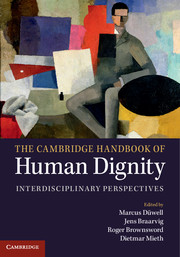Book contents
- Frontmatter
- Contents
- List of contributors
- Foreword
- Why a handbook on human dignity?
- Acknowledgments
- 1 Human dignity from a legal perspective
- 2 Human dignity: concepts, discussions, philosophical perspectives
- Part I Origins of the concept in European history
- Part II Beyond the scope of the European tradition
- Part III Systematic conceptualization
- 19 Social and cultural presuppositions for the use of the concept of human dignity
- 20 Is human dignity the ground of human rights?
- 21 Human dignity: can a historical foundation alone suffice? From Joas’ affirmative genealogy to Kierkegaard's leap of faith
- 22 Kantian perspectives on the rational basis of human dignity
- 23 Kantian dignity: a critique
- 24 Human dignity and human rights in Alan Gewirth's moral philosophy
- 25 Human dignity in the capability approach
- 26 Human dignity in Catholic thought
- 27 Jacques Maritain's personalist conception of human dignity
- 28 Scheler and human dignity
- 29 Dignity and the Other: dignity and the phenomenological tradition
- 30 Dignity, fragility, singularity in Paul Ricœur's ethics
- 31 Human dignity as universal nobility
- 32 Dignity in the ubuntu tradition
- 33 Posthuman dignity
- 34 Dignity as the right to have rights: human dignity in Hannah Arendt
- 35 Individual and collective dignity
- Part IV Legal implementation
- Part V Conflicts and violence
- Part VI Contexts of justice
- Part VII Biology and bioethics
- Appendix 1 Further reading
- Appendix 2 Universal Declaration of Human Rights
- Index
27 - Jacques Maritain's personalist conception of human dignity
from Part III - Systematic conceptualization
Published online by Cambridge University Press: 05 March 2015
- Frontmatter
- Contents
- List of contributors
- Foreword
- Why a handbook on human dignity?
- Acknowledgments
- 1 Human dignity from a legal perspective
- 2 Human dignity: concepts, discussions, philosophical perspectives
- Part I Origins of the concept in European history
- Part II Beyond the scope of the European tradition
- Part III Systematic conceptualization
- 19 Social and cultural presuppositions for the use of the concept of human dignity
- 20 Is human dignity the ground of human rights?
- 21 Human dignity: can a historical foundation alone suffice? From Joas’ affirmative genealogy to Kierkegaard's leap of faith
- 22 Kantian perspectives on the rational basis of human dignity
- 23 Kantian dignity: a critique
- 24 Human dignity and human rights in Alan Gewirth's moral philosophy
- 25 Human dignity in the capability approach
- 26 Human dignity in Catholic thought
- 27 Jacques Maritain's personalist conception of human dignity
- 28 Scheler and human dignity
- 29 Dignity and the Other: dignity and the phenomenological tradition
- 30 Dignity, fragility, singularity in Paul Ricœur's ethics
- 31 Human dignity as universal nobility
- 32 Dignity in the ubuntu tradition
- 33 Posthuman dignity
- 34 Dignity as the right to have rights: human dignity in Hannah Arendt
- 35 Individual and collective dignity
- Part IV Legal implementation
- Part V Conflicts and violence
- Part VI Contexts of justice
- Part VII Biology and bioethics
- Appendix 1 Further reading
- Appendix 2 Universal Declaration of Human Rights
- Index
Summary
If civilization is to be salvaged, the new age of civilization will have to be an age of theocentric humanism. Today, human dignity is trampled under foot far and wide. Even worse, it collapses from the inside, for guided by the pure perspective of science and technology we are at a loss when it comes to discovering the rational foundations of the dignity of the person, and to believing in these.
(Maritain 1990: vol. IX, 363)This text, uneasy, written at the end of the Second World War as bolshevist totalitarianism spread over large parts of Europe, clearly marks the twofold character of Maritain's approach to dignity: rooted in a lucid and bemused view of historical actuality, it calls for philosophical, metaphysical and even theological steps towards finding an adequate response to the challenges of the present; challenges which science and technology are incapable of meeting. As such, Maritain the metaphysician (and theologian) is inseparable from Maritain the political watchdog – and even agent, since he was one of the indirect architects of the 1948 Charter of the United Nations on account of his membership of a UNESCO enquiry commission on human rights. His concern for human dignity, therefore, does not ignore the diversity of conceptions and practices made manifest to him by his experience with the preparation of the Charter. Yet, at the same time, the philosopher is convinced that, without a strong metaphysical foundation, the concept of dignity risks being effaced from the human consciousness. It is with this metaphysical and historical background in mind that Maritain's philosophy of dignity ought to be approached.
- Type
- Chapter
- Information
- The Cambridge Handbook of Human DignityInterdisciplinary Perspectives, pp. 260 - 268Publisher: Cambridge University PressPrint publication year: 2014
- 2
- Cited by

